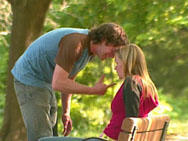 As a journalist and an college instructor using social science methodology, I also take issue with 20/20's arrogance at framing these reports as "social experiments." The producers and reporter failed to follow any of the practices or conventions of social science research when they ignored issues of confidentiality and informed consent.
As a journalist and an college instructor using social science methodology, I also take issue with 20/20's arrogance at framing these reports as "social experiments." The producers and reporter failed to follow any of the practices or conventions of social science research when they ignored issues of confidentiality and informed consent.
Furthermore, they put the subjects and "actors" in this test at risk. I watched and wondered whether any of the subjects on camera would use violence with the actor playing the abuser.
I was also surprised that academics/researchers were interviewed and played along with ABC’s tactics and reviewed the hidden camera video to offer feedback. That just underscores that it's okay to do the wrong thing if your intentions are dressed up as research (and it also can get you on TV).
The reporter included interviews with Professor Richard Gelles, an expert on domestic violence and dean of the University of Pennsylvania's School of Social Policy & Practice.
The 20/20 report showed what appeared to be Gelles viewing the hidden tapes with what I assume were students. However, it’s very possible his interview was recorded under false pretenses and taken out of context. This type of program essentially conducted experiments to see how people would react (a variation on Candid Camera or Scare Tactics) and hoped people would be willing to sign the consent form afterward (continued in next weblog entry).
No comments:
Post a Comment